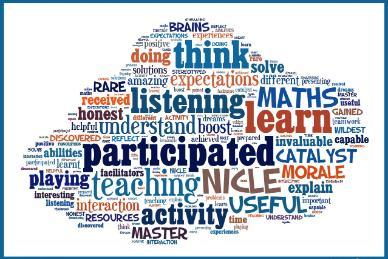NICLE Project
Explore the NICLE Activities for each year: 2011 2012 2013
The Numeracy Inquiry Community of Leader Educators (NICLE)
NICLE is based on a partnership between in-service teachers, staff in the Chair and key partners of the Chair. Together this community will meet regularly and work together to address each of the objectives of the chair from a classroom practice based perspective. The second community is based on research participants actively engaged in numeracy research – they will include post graduate students, teacher researchers, and lecturers and professors.
The NICLE Community in 2013
Our Chair partners with the FRF Mathematics Education Chair at Rhodes University which began working with highschools in the broader Grahamstown area in 2010. When our Chair project began in 2011 we thus invited feeder schools to the FRF Mathematics Chair Project schools as required in our proposal to funders. Our funding provides for work with teachers from ten schools in the broader Grahamstown area, with a focus on grades 3 and 4. Grahamstown District advisors were further consulted in relation to the invitation of these schools to participate in the NICLE programme. In 2013, following requests from several teachers and schools not in the NICLE program to be part of the program, we have adapted our Seminar series program so as to include ‘open afternoon sessions’ which these teachers can participate in.
Why Numeracy?
Our focus will be on numeracy learning within primary schools. Our initial focus will be on Grades 3 to 4 allowing engagement across the foundation and intermediate phase.
Why Inquiry?
Inquiry has three meanings: search for knowledge; an instance of questioning; and a systematic investigation of a matter of public interest. Each of these will be central to the practice of the Community
Why Community?
Communities of practice provide the opportunity for leading edge learning.
On the one hand, a community of practice is a living context that can give newcomers access to competence and also invite a personal experience of engagement by which to incorporate that competence into an identity of participation. On the other hand, a well functioning community of practice is a good context to explore radically new insights without becoming fools or stuck in some dead end. A history of mutual engagement around a joint enterprise is an ideal context for this kind of leading-edge learning, which requires a strong bond of communal competence along with a deep respect for the particularity of experience. When these conditions are in place, communities of practice are a privileged locus for the creation of knowledge (Wenger, 1998, p.214).
In this inquiry community teachers, Chair staff and key partners will form a partnership in which we are all co-learners. In this co-learning agreement we will all be participants engaged in the common goals of the chair objectives. By working together we will each bring different experiences and expertise to share in the community.
Through active participation in the community “each (of us) might learn something about the world of the other. Of equal importance, however each may learn something more about his or her own world.” (Wagner, 1997, p.16 in Jaworski, 2005, p104)
Teachers are critical partners in searching for sustainable and practical solutions to the challenges in numeracy education. We see it as essential that we look towards the way forward with numeracy classrooms and teacher experiences as the foundational basis from which to proceed with dialogue and inquiry.
Through on-going commitment and active participation of all members in the community a strong learning community of practice will emerge where innovative solutions will emerge.
Why Leader Educators?
We take as a starting point that all in NICLE are life-long learners and that being a professional educator involves being actively engaged in opportunities for life- long learning. Our brief in these chairs is to provide leadership to the field of numeracy education in the broader Grahamstown area, in South Africa and beyond. Through active participation and on-going inquiry in NICLE each of us will become a leader educator able to lead others in discussion and dialogue around numeracy education. And so for participating teachers for example we envisage in time: organising learner focused initiatives in schools and/or clusters, taking the lead in one’s school (or cluster of schools) in planning numeracy programs; mentoring colleagues and/or new teachers; providing input into documentation provided by districts and the department of education (including into curriculum documents); presenting ideas and seminars in NICLE, in local, regional and national conferences; sharing ideas in local media and in teacher focused journals and so forth.
Last Modified: Thu, 21 Feb 2013 08:24:01 SAST

